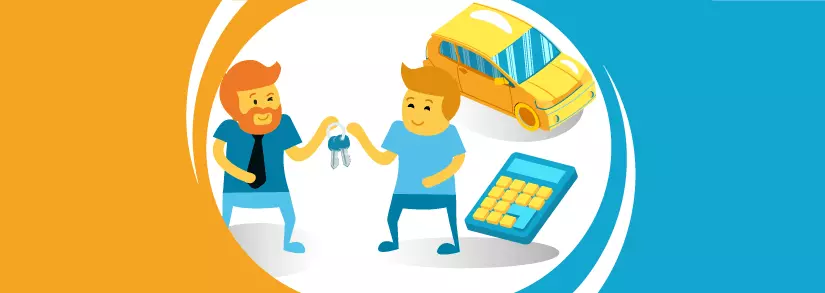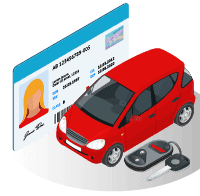A Guide to Renting a Car in France

Want to subscribe to a French energy offer?
Our English-speaking Selectra advisors are here to help you find the right energy plan.
(foreign IBANs accepted) at [email protected]. You can contact us also:

Are you looking to explore the French countryside? Has France become your home away from home but you wish you didn’t have to take public transit?
We get it: you want a car, and you want it fast. But where to start? Here we break down the nitty-gritty and give you the best tips to find the cheapest French car hire for your needs
Before I rent a car... Can I even drive in France?

Your licence must be valid for at least one year beyond the date of rental. For some cars, such as luxury vehicles or 4x4s, this may extend to three or even 10 years.
Under short-term visiting conditions, using your international licence is perfectly fine.
If you’ve moved to France from another European Union country, your licence from your home country will be accepted as a legal licence.
If you’ve moved to France from a country outside of the European Union, the licence from your home country will be accepted for up to one year after your move. Afterwards, you’ll have to apply for a French licence (permis de conduire), or an International Driver’s Permit (IDP).
Certain non-EU countries have an agreement with France, allowing new French residents / expats to trade in their driver’s licence for a French one without having to re-do a written or practical test. If you go to France’s public service website, they’ll give you all the details.
Where can I rent a car in France?

Major travel intersections such as airports or train stations will have multiple car rental services, ranging from Enterprise Rent-A-Car to Avis to Hertz. Stopping by or calling these kiosks is the easiest way to go about renting a car when you’re already in the country.
Discover Car Hire is also an easy way online to compare prices and car types being offered from different rental companies.
You must be at least 21 years old to rent a car in France. If you are under 25, you may be charged a young driver surcharge to offset the additional insurance charges for younger drivers. This can range from 25 to 40 euros a day.
Book your car early! Car rental is popular in France, given all the tourists who are looking to travel throughout the country on their own. It’s best to start looking into a rental three months in advance. Not only does this get a pesky travel errand out of the way, you’ll also save a considerable amount of money the earlier you book.
What documents do I need to rent a car in France?

As with most bureaucratic things in France, you’ll need a handful of personal documents on hand.
These include:
- Proof of identity. For those of you coming from outside the European Union, bring your passport.
- Driver’s licence.
- A credit card in the renter’s name.
- A proof of income, such as a utility bill.
What types of cars can I rent in France?

Typical French cars are small or mid-size, fitting about four or five people inside. These types of cars are also hatchbacks (a.k.a, no trunk space!).
Can you rent an SUV or a minivan? Yes. Will you want to? Probably not. French streets are typically smaller than average, especially when you’re winding your way through the French alps, and the cars reflect that.
Take into account how many people are travelling in the vehicle and how much space each person will need. It may very well be better to travel in two smaller cars than one large one.
Most French cars have a manual transmission (otherwise known as a “stick shift”) by default. If you’re from North America, you’ll probably want to request a car with an automatic transmission. These types of car will be a bit more expensive, but it’s better than trying to figure out a manual drive if you’ve never done so. Trust us: take the safe route and pay the extra charges, so you’re completely comfortable while driving in France.
If you need any extra equipment such as a carseat or GPS, you can order these while you’re booking your car. Reserving these things in advance will also save you money in the long run.
Another tiny reminder: people in France drive on the right side of the road, and the steering wheel is on the left side of the car. It may seem obvious to some expats, but for others it’s a whole new world, and something that can slip your mind when travelling to a new place.
Consider taking a day or two to practice driving on the right side if you don’t usually do so back home. This will help you avoid any confusion or nervousness later on.
How can I find the cheapest car hire in France?

The cost all depends on the size of the vehicle you want, the rental company you’re using and how far in advance you book.
Rental companies will also require a deposit upon booking to cover any damage or potential additional charges. Remember that all prices include VAT (French value-added tax), which is set around 20%.
Rental companies will not accept a deposit through a debit card, so make sure you have a valid credit card with enough balance available for this transaction.
Can I add an extra driver to my French rental car?
Yes, though this may be subject to an extra fee depending on the amount and age of drivers you’re adding.
Usually an additional driver fee will be charged on a per-day basis. Sometimes a rental will offer a free additional driver, but this depends on the company and rental contract.
As mentioned earlier, drivers under the age of 25 may be subject to a young driver surcharge to offset additional insurance fees being charged to the rental company.
What kind of French driving insurance do I need?
Third party insurance is required by law in France, but this will usually already be included in the rental price. This covers damage and injury incurred by a third party, even if you were the one responsible.
Your credit card company may also have car insurance included in your account. Look into the details with your bank, and if this works best for you, make sure you use that bank card to rent your car in order to be covered.
Optional additional French car insurance is available to be purchased on top of third party insurance.
This includes:
- Collision Damage Waiver (CDW)
- Theft Protection (TP)
- Roadside Assistance Personal Accident Insurance (PAI)

The prices for these types of insurance will vary depending on the company you’re renting from, the type of car you’re renting and the location of your rental company.
If you are interested in purchasing these extra insurance packages, your deductible -- an amount of money you agree to pay before your insurance covers you in the event of damage or injury and which is fairly high in France -- will be reduced.
I’ve rented my French car. Now what?
There are a few more things to keep in mind once you’ve successfully rented your vehicle.
1 - Verify the car’s condition
Make sure the car is in good shape, both inside and out, when you pick it up. If there are any damages, take photos and notes to ensure you won’t be charged and put at fault by the rental company when you return the car.
2 - Double-check the emergency equipment
All cars in France are required to have the following items:
- A yellow high-visibility vest
- Headlamp converters
- A GB sticker (if applicable)
- A warning triangle
- Spare bulbs
- Breathalyzers
Make sure that the car you’ve rented has these items, too.
3 - Keep an eye on the fuel gauge

On your rental car contract, it will lay out what fuel policy the company requires on the car’s return.
With a full-to-full fuel policy, you won’t have to pay anything upfront, but it is expected that you will return the car with the same amount of gas it had when you picked it up (usually a full tank).
With a full-to-empty fuel policy, you will pre-pay for an amount of gas upfront, and you can return the car with the tank almost empty.
Keep in mind that rental companies will charge a premium on fuel based on the highest price per litre in the area. To save some money, it’s best to opt for the full-to-full fuel policy and fill up the tank right before you’re about to drop it back at the rental company.
That way you’ll avoid paying the premium rates on fuel after the company fills the tank back up again for the next customer, if you were to opt for the full-to-empty fuel policy.
4 - Watch your mileage/kilometres
Check if your rental comes with limited or unlimited mileage / kilometres. Limited rentals usually offer 100 to 300 kilometres per day, and will charge you 0.05 to 2 Euros for every kilometre over the limit.
Can I drive my French rental car into other countries?
Most of the time yes, you can.
Most Western European countries (i.e. Germany, Spain, Italy) will allow you to travel through them without any extra costs
Some Eastern European countries (i.e. Hungary, Czech Republic, Greece) will charge you a small fee.
Some countries will not allow you to pass through at all.
Make sure to ask your rental company for more details on where exactly you can go, and if your rental insurance covers you the same as it would in France.
If you’re planning on taking the car to an island such as Corsica, please note that rentals are not allowed on ferries. You will have to leave the car on mainland France and rent a separate car once you arrive on the island.
Can I drop my French rental car in a different French city or another country?

Yes, but be aware of extra fees!
If you drop your rental off in a different French city than the one you picked it up in, you may be charged a domestic one-way fee.
If you drop your rental off in a completely new country, you will be charged an international one-way fee.
Check in with your rental company to clarify the potential charges before you head out.
Happy driving!